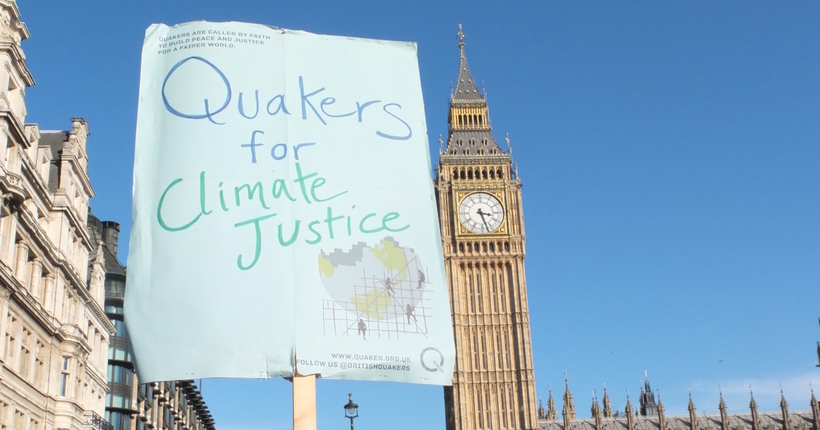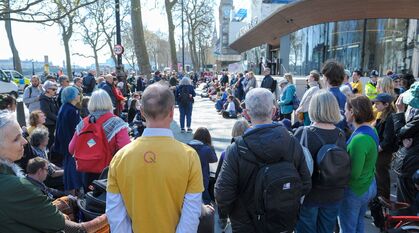General election manifestos: how do they fare on climate justice?
Rebecca WalkerWoo looks at the manifestos for political parties running in the upcoming general election. How do they fit with Quaker calls for climate justice?

Quakers are committed to equality and sustainability. We want to see a world in which all living beings can thrive. The upcoming general election is likely to bring about a change of politics. What might this look like? And how can we ensure that climate justice is at the heart of future government action?
What are Quakers calling for in this general election?
Quakers in Britain are focusing on three key areas for climate justice in this general election:
- Phasing out fossil fuels – ending public subsidies and policies that enable oil and gas extraction.
- Committing to and investing in a just transition to a sustainable economy – redirecting public funding from supporting fossil fuel extraction to fair and sustainable solutions to the climate and cost-of-living crises, such as renewable energy and home insulation.
- Establishing new sources of finance for the international Loss and Damage Fund to help compensate climate vulnerable countries, most of whom have done the least to cause climate change. One way to do this would be taxing fossil fuel giants to pay for the climate-induced loss and damage caused by their polluting activities.
How do the manifestos fare on Quaker climate justice priorities?
Phasing out fossil fuels
Energy policy (including coal mining and offshore oil extraction) is a reserved matter, meaning decisions on energy are taken by the UK Parliament at Westminster.
- Against this backdrop, the Scottish National Party (SNP) call for an evidence-based approach to oil and gas extraction that bears in mind both climate obligations and energy security considerations. They take a stronger position on coal, calling for a ban on new coal licences (echoing Scotland's use of devolved planning powers to block future extraction) – this commitment to ban coal is echoed by Plaid Cymru, Labour and the Liberal Democrats.
- Labour's position on fossil fuel production in the UK focuses on energy security and job protection (the Conservatives take a similar line). Like the Green Party, Labour commit to not issuing new licences for exploration. Unlike the Green Party (whose manifesto is the strongest on phasing out fossil fuels), Labour would not revoke existing licences. The Labour and Conservative manifestos are silent on fossil fuel subsidies, meanwhile the Liberal Democrats and Green Party commit to ending them.
- Reform UK's 'contract' takes the opposite approach stating they would fast-track licences of North Sea gas and oil, as well as introducing test sites for the controversial and banned practice of fracking for shale gas. Reform see Britain's oil and gas as key to slashing energy bills and unleashing economic growth.
Committing to and investing in a just transition to a sustainable economy
All the political parties use different ways to describe the transition to a sustainable economy. Some choose not to incorporate justice – Labour uses a 'clean energy transition', while Reform and the Conservatives focus on the 'path to net zero' (or not, in Reform's case). Policies supporting a transition to a sustainable economy range from investment in clean power to improvements to the energy efficiency of UK housing stock and include a number of financing proposals.
- Labour focuses on its 'Green Prosperity Plan' to invest £15 billion a year (only roughly £5 billion a year more than the current government). Labour and the SNP also emphasise the need to protect existing jobs in the fossil fuel industry while creating new clean energy jobs, in contrast to the Green Party and Plaid Cymru who focus on the need to reskill and support workers in the fossil fuel industry into green or non-carbon intensive industries.
- The Green Party estimates the cost of a just transition at £40 billion a year, funded by a carbon tax to make polluters pay, wealth taxes, and leveraging private and public finance. They project the carbon tax will raise an additional £80 billion by the end of the next Parliament. This tax is similar to the climate damages tax proposed by our Make Polluters Pay coalition. The Liberal Democrats also emphasise taxing wealth but their manifesto lacks detailed financing plans for the transition.
- Plaid Cymru and the SNP both call for greater powers for Wales and Scotland to manage a just transition on their own terms.
Establishing new sources of finance for the international Loss and Damage Fund
Three out of six of the manifestos include references to climate-induced loss and damage: the SNP, Green Party and Liberal Democrats.
- The SNP highlight Scotland's role as the first developed nation to commit funding to address loss and damage. They call for the UK to follow Scotland's leadership and to make sure its funding commitments are truly additional and not the repurposing of existing commitments (as they have been so far).
- The Green Party place a figure on climate finance for the Global South stating they would make it 1.5% of Gross National Income by 2033, with an additional contribution to the newly established international Loss and Damage Fund.
- The Liberal Democrats talk about the need for continued support to the Loss and Damage Fund to ensure a just transition for all (i.e. all around the world).
Making the most of the final week before the election
In the final week before the general election, there are many ways you can take action and understand what your local candidates stand for. Visit the Quakers in Britain General Election webpage for guides for all ages on engaging with the election, along with templates and materials to contact candidates.
For an interfaith perspective, you can check the Faith for the Climate General Election webpage. It details our call for a fast, fair phase-out of fossil fuels and holding big polluters accountable for climate damage. You'll also find a hub with information on building support for future climate and nature bills, and tools to research local candidates and climate action.
This is the second of a series of blogs examining the 2024 general election manifestos. Read the first blog on democracy, human rights and migration and the third on peace and security.


